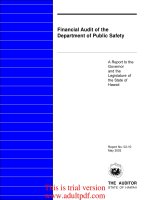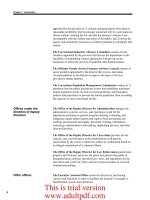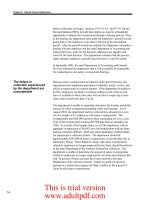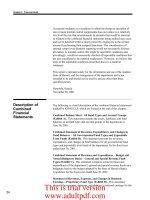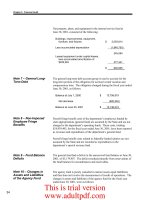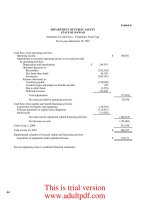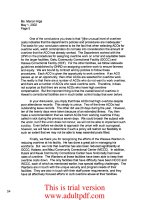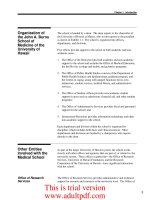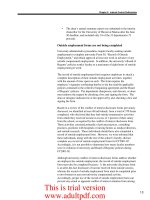FINANCIAL AUDIT First Audit of the Library of Congress Discloses Significant Problems _part1 potx
Bạn đang xem bản rút gọn của tài liệu. Xem và tải ngay bản đầy đủ của tài liệu tại đây (770.1 KB, 10 trang )
GAO
-, _I_ _ ,_ “__l”l-“-_ . . _ ^_.
_l__l ._
A~r~wt l!l!j I
FINANCIAL AUDIT
First Audit of the
Library of Congress
Discloses Significant
Problems
I\
lllllllllllIllll
144672
This is trial version
www.adultpdf.com
This is trial version
www.adultpdf.com
GAO
United States
General Accounting Office
Washington, D.C. 20648
Accounting and Financial
Management Division
B-234602
August 22,199l
The Honorable James H. Billington
Librarian of Congress
Dear Dr. Billington:
In response to your request to provide you with a better understanding
of the Library’s financial affairs, we audited the financial operations of
the Library of Congress. Specifically, as part of our work, we examined
available financial information on the Library and reviewed its internal
accounting controls and its compliance with laws and regulations for the
fiscal year ended September 30, 1988. This report covers the results of
our audit for fiscal year 1988 and points out steps that the Library has
taken and needs to take to improve its financial operations.
This was the first attempt to audit the financial operations of the
Library. Because audited opening balances were not available for the
Library’s statements of operations and cash flows, our review was lim-
ited to the consideration of financial information in its consolidated
statement of financial position as of September 30, 1988. Further, prac-
tical limitations on our ability to apply certain procedures required by
generally accepted government auditing standards precluded us from
giving an opinion on this statement. Otherwise, our work was performed
in accordance with generally accepted government auditing standards.
Results in Brief
We found the Library’s financial and accounting records to be in such
poor condition that we were unable to audit significant account bal-
ances. Because of weaknesses in the Library’s financial management
operations, its ability to account for and control its collection of an esti-
mated 89 million books and other materials was limited. Also, the risk
was high that (1) other assets could have been lost or misappropriated,
(2) material errors or irregularities could have occurred in the
processing of the Library’s financial transactions without being
promptly detected, (3) appropriated funds could have been used for
purposes other than those intended by the Congress, and (4) Library
programs and activities could have been operated in a manner not
intended by agency management or the Congress.
A detailed discussion of the Library’s internal control deficiencies is
presented in appendix I. Appendix II discusses instances in which the
Library did not comply (or in which we could not assess the Library’s
Page 1
GAO/AFMD-91-13 First Audit of the Library of Congress
This is trial version
www.adultpdf.com
B234502
compliance) with applicable laws and regulations. Appendix III presents
the consolidated statement of financial position as of September 30,
1988, and the limitations which precluded an audit opinion thereon. We
caution users that this consolidated statement has limited reliability.
Accounting and
We are seriously concerned about the limited controls over the Library’s
Control of the
collection of books and other materials. While the Library provides a
degree of physical security over its collections through (1) its guard
Collection and Other
force, (2) special precautions for invaluable items, and (3) various cata-
Assets and Liabilities
loging systems, its quantity records related to the collection are not
Impaired
accurate and dollar accountability is not maintained. Neither the quan-
tity of items in the Library’s collection nor the value of the collection
(estimated to be $6.8 billion at year-end) could be substantiated.
Without proper accountability and other related internal controls, losses
or misappropriations can occur and not be detected and the Library’s
ability to protect this national treasure is limited.
In addition:
. the Library had no cost records for its furniture and furnishings,
l
the Library could not support its reported accounts receivable or its
advances from others and failed to record other liabilities, and
. the Library could not effectively prevent duplicate or incorrect
payments.
Financial Information
The Library was unable to produce reliable financial management infor-
Has Limited Reliability
mation needed to support internal management of its programs and
activities as well as its external reporting to the Treasury and the Con-
gress. Our review disclosed a number of instances where the Library did
not follow generally accepted accounting principles
(GAAP)
for the fed-
eral government and internal control standards prescribed in
GAO’S
Policy and Procedures Manual for Guidance of Federal Agencies.’
‘As a legislative branch agency, the Library is not bound by the requirement in 31 USC. 3611 that
executive agencies comply with the accounting principles and standards prescribed by the Comp
troller General. However, the requirements in Title 2 as well as in other titles of that manual, such aa
Title 7, which deals with fiscal procedures, do provide effective financial management controls. The
Library chose in preparing its 1988 financial statements to follow the reporting requirements of
Title 2.
Page 2
GAO/AFMDQl-13 First Audit of the Library of Congress
This is trial version
www.adultpdf.com
B234f502
Library management had not otherwise provided the internal control
guidance needed to ensure the effective integration of its systems and
processing of its financial transactions. Specifically,
uniform accounting policies and procedures were not prescribed, docu-
mented, or followed (appendix I),
the financial management system was not complete or integrated
(appendix I),
routine reconciliations of accounts were not conducted (appendix I), and
no method existed to reliably determine the cost of reimbursable ser-
vices the Library provides to others or to ensure that it complied with
restrictions on employees paid from indirect cost reimbursements
(appendix 11).
FEDLINK Program
Controls Weak
Weaknesses in the Library’s controls over its Federal Library and Infor-
mation Network
(FEDLINK)
bibliographic and data base retrieval services
provided to federal agencies have adversely affected both its ability to
achieve intended program objectives and its ability to comply with
applicable laws and regulations. As a result, the Library was unable to
ensure proper fund control and was vulnerable to violations of the Anti-
Deficiency Act and other relevant statutes. Specifically, the Library
awarded contracts to provide services which were not consistent with
the purpose of the
FEDLINK
program (appendix I),
used expired funds (appendix II) and amounts in excess of authorized
obligation limits (appendix I) to pay for
FEDLINK
services,
obligated
FEDLINK
funds without proper authorization or documentation
(appendix I),
did not satisfy competition requirements before awarding
FEDLINK
con-
tracts (appendix II), and
could not demonstrate that its automated data processing
(ADP)
contract
awards under the
FEDLINK
program were properly authorized (appendix
II).
In addition, as set forth in appendix II, the Library made unauthorized
use of revolving gift funds and improperly accepted nonappropriated
fund reimbursements as gifts.
Library Has Initiated
Since the period covered by our review, new Library managers have
Action
reported taking a number of steps to improve the conditions described in
this report, including
Page 3 GAO/AFMD-91-13 First Audit of the Library of Congress
This is trial version
www.adultpdf.com
5234602
. obtaining resources to get bibliographic control over the backlog of
uncataloged collection items,
l
establishing a framework of Financial Services Directives for issuing
accounting principles and standards,
l
adopting a policy requiring annual reviews of the Library’s accounting
systems,
9 conducting a study to establish a basis for overhead charges on reim-
bursable services,
l
restricting
FEDLINK
services to designated program purposes,
l
discontinuing the carryover of expired funds to pay for the following
year’s FEDLINK services,
l
documenting sole-source justifications for
FEDLINK
contracts over
$25,000,
. adopting a policy allowing only the procurement of authorized
ADP
ser-
vices, and
. stopping the use of gift fund accounts to accept and retain fees from
nonfederal customers.
These steps, if properly carried out and monitored, should result in sig-
nificant improvements over the situation we found in 1988. However,
many of the problems in the Library’s financial management operations
are wide-ranging and will require a sustained effort and additional
resources over a number of years before they are fully corrected. In
addition, the problems related to the Library’s collection have not yet
been completely addressed and need prompt management attention.
To ensure full implementation of the above actions and to correct the
problems discussed in this report, we are recommending that you desig-
nate a chief financial officer to act as the focal point to (1) bring the
Library’s collection under good accounting control, (2) establish policies
and procedures that are consistent with Title 2, and (3) develop and
implement a financial management improvement plan with specific
milestones. Our specific recommendations are set forth in more detail in
our reports on internal accounting controls (appendix I) and on compli-
ance with laws and regulations (appendix II).
Agency Comments and
The Library of Congress provided written comments on a draft of this
Our Evaluation
report. These comments are presented in appendix IV. The Library gen-
erally agreed with our findings and recommendations. It also pointed
out actions already taken to bring its collection under bibliographic and
Page 4
GAO/AF’MD-91-13 First Audit of the Library of Congress
This is trial version
www.adultpdf.com
B-224592
physical control, improve its overall financial policy and direction, cor-
rect deficiencies in the financial operations of its
FEDLINK
program, and
request statutory authority for its revolving fund activities.
However, the Library disagreed with our findings in two areas. First, it
disagreed that it should attempt to value its collection now because such
valuation would not be practical until it has a complete item listing. As
discussed in appendix I, we believe the Library should record and main-
tain cost information on all new acquisitions. If it does not start doing
this now, future efforts to value items in the collection will be more
difficult.
The Library also disagreed that its records were inadequate to assess
compliance with the statutory limit of 66 on the number of employees
paid from indirect cost reimbursements. Our audit disclosed that the
Library lacks a reliable method to accumulate costs; therefore, as dis-
cussed in appendix II, it cannot ensure that it is complying with the
employee limitation.
We are sending copies of this report to the Senate and House Appropria-
tions Committees; the Joint Committee on the Library; the Senate Com-
mittee on Rules and Administration; and the Subcommittee on Libraries
and Memorials, Committee on House Administration. We would like to
thank you and your staff for the cooperation and courtesy provided
during our review.
Sincerely yours,
Donald H. Chapin
Assistant Comptroller General
Page 5
GAO/AFMD=91-13 First Audit of the Library of Congress
This is trial version
www.adultpdf.com
Contents
Letter
Appendix I
1
8
Report on Internal
Accounting Controls
Assets and Liabilities Not Controlled
Financial Management Policies and Procedures Not
Uniformly Prescribed, Documented, or Followed
10
16
Weak Controls Over FEDLINK Program
20
Conclusions
26
Recommendations
27
Agency Comments and Our Evaluation
28
Appendix II
Report on Compli .ance
Funds Transferred to FEDLINK Program Improperly
With Laws and
Used in Subsequent Fiscal Years
Regulations
The Library’s Revolving Fund Operations Exceeded Its
Statutory Authority
The Library Improperly Accepted Nonappropriated Fund
Reimbursements as Gifts
Some FEDLINK Contract Awards Violated the
Advertising Act
The Library’s Records Cannot Be Used to Assess
Compliance With Cost Controls in the Economy Act
The Library’s Records Cannot Be Used to Assess
Compliance With the 1988 Legislative Branch
Appropriations Act
The Library’s Procedures Could Not Be Relied Upon to
Ensure Compliance With Limitations on ADP Service
Procurements
Conclusions
Recommendations
Agency Comments and Our Evaluation
-
29
29
31
32
32
33
34
35
35
36
36
Page 6
GAO/m-91-13 First Audit of the Library of Congress
This is trial version
www.adultpdf.com
C4mtenta
Appendix III
38
Consolidated
Consolidated Statement of Financial Position
Statement of Financial
Notes to the Consolidated Statement of Financial Position
39
40
Position of the Library
of Congress for the
Fiscal Year Ending
September 30,1988
Appendix IV
Comments From the
Library of Congress
53
Abbreviations
ADP
automated data processing
EmA
basic ordering agreement
CIW
Chief Financial Officer
FARS
Financial Accounting and Reporting System
FEDLINK
Federal Library and Information Network
FMFIA
Federal Managers’ Financial Integrity Act
GAAP
generally accepted accounting principles
GAO
General Accounting Office
GSA
General Services Administration
Page 7
GAO/AF’MD-91-13 First Audit of the Library of Cougrese
This is trial version
www.adultpdf.com
Appendix I
&port on Internal Accounting Controls
As part of our attempt to audit the financial statements of the Library
of Congress as of September 30, 1988, we made a study and evaluation
of the system of internal accounting controls to the extent we considered
necessary to evaluate the system as required by generally accepted gov-
ernment auditing standards.
The purpose of our study and evaluation was to determine the nature,
timing, and extent of the auditing procedures necessary for expressing
an opinion on the Library’s financial statements. For purposes of this
report, we have classified the significant internal accounting controls
into the following categories:
. the collection,
l
financial reporting,
. payroll,
. procurement,
. property and equipment,
. revenue, and
. treasury.
We limited our study and evaluation of the control categories listed
above to a preliminary review of the system in order to obtain an under-
standing of the control environment and the flow of transactions
through the accounting system. Because we could not rely on the
Library’s internal control system, and because it was more efficient to
expand substantive audit tests, our study and evaluation of the internal
accounting controls did not extend beyond this preliminary review
phase.
The Library’s management is responsible for establishing and main-
taining an effective system of internal accounting controls. In fulfilling
this responsibility, estimates and judgments by management are
required to assess the expected benefits and related costs of control pro-
cedures. The objectives of a system of internal accounting controls are
to provide management with reasonable assurance that (1) obligations
and costs are in compliance with applicable laws, (2) funds, property,
and assets are safeguarded against waste, loss, and unauthorized use or
misappropriation, and (3) assets, liabilities, revenues, and expenditures
applicable to operations are properly recorded and accounted for to
permit the preparation of reliable financial reports and to maintain
accountability over the Library’s assets. Because of inherent limitations
in any system of internal accounting controls, errors or irregularities
may nevertheless occur and not be detected. Also, projection of any
Page 8 GAO/m-91-13 First Audit of the Library of Congress
This is trial version
www.adultpdf.com
